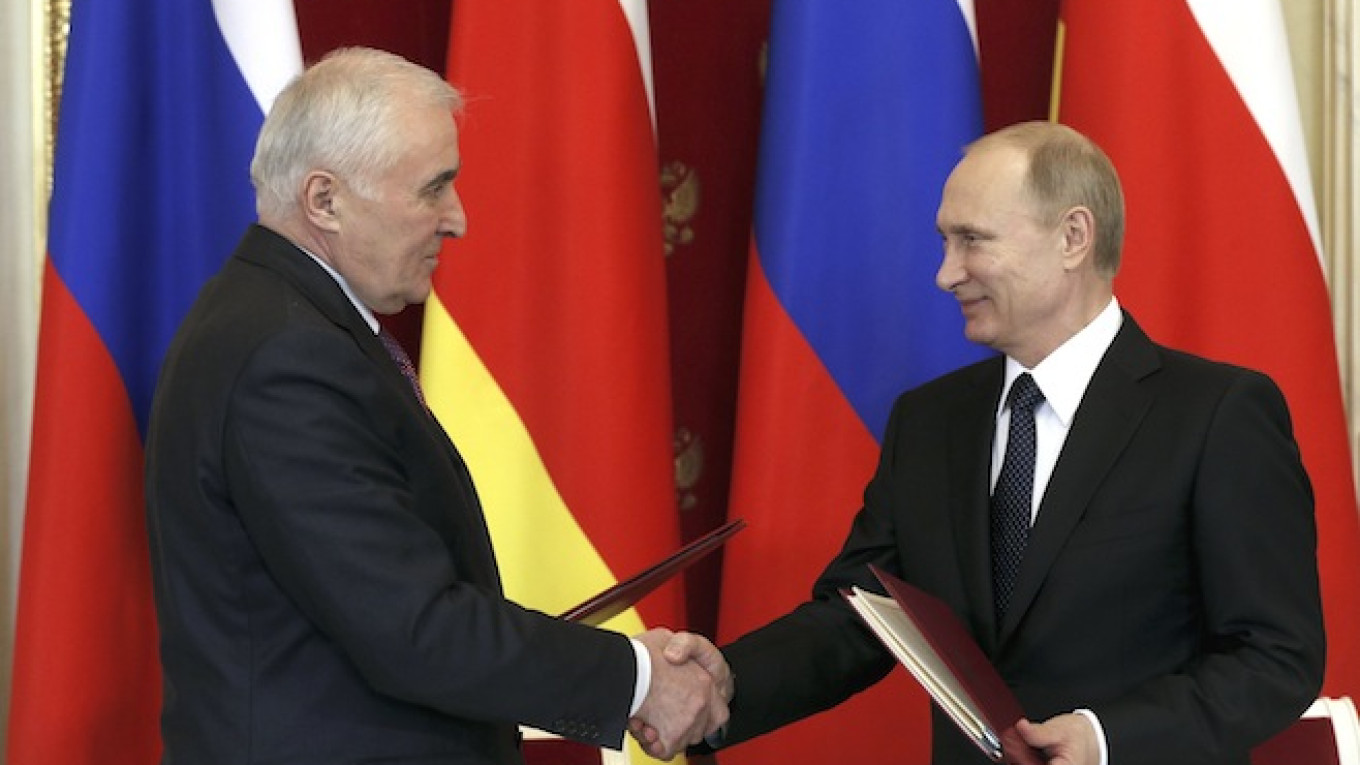President Vladimir Putin signed a treaty with Georgia's rebel South Ossetia region on Wednesday that almost completely integrates it with Russia, alarming Georgia and the West a year after Moscow took over Crimea.
Tbilisi described the "alliance and integration" treaty as a "move aimed at annexation" and the United States, European Union and NATO said they would not recognize the agreement, which the EU depicted as a threat to regional security and stability.
Under the deal, signed in the Kremlin by Putin and South Ossetian leader Leonid Tibilov, a former KGB official, the region's security forces, military, economy, customs service and border guards will be deeply integrated with those of Russia.
Russia won a five-day war with Georgia in 2008 over the fate of South Ossetia and another rebel region, Abkhazia. It formally recognizes both regions as independent states and signed a similar treaty with Abkhazia last year.
"Another step is being taken today to strengthen our partnership," Putin said after signing what he described as a "landmark" treaty in the Kremlin, with the Russian and South Ossetian flags behind him.
Tibilov hailed the agreement, which will make it easier for the people of South Ossetia to gain Russian citizenship, as "the best possible guarantee of state security." He said EU and U.S. officials should mind their own business.
As they signed the treaty, thousands of people gathered for a concert in the shadow of the Kremlin walls to celebrate the first anniversary of Crimea's annexation from Ukraine, a show of public support for Putin and his assertive foreign policy.
The moves to draw in Abkhazia and South Ossetia, an impoverished region with a population estimated at between 30,000 and 50,000, have alarmed the West and Georgia, a former Soviet republic crossed by gas and oil pipelines to Europe.
"It's a cynical and provocative step by Russia. … We consider it a move aimed at annexation," Georgian Foreign Minister Tamar Beruchashvili said of the treaty in Tbilisi.
NATO Secretary-General Jens Stoltenberg said the agreement "violates Georgia's sovereignty and territorial integrity and blatantly contradicts the principles of international law, OSCE principles and Russia's international commitments.
"This so-called treaty is yet another move by the Russian Federation that hampers ongoing efforts by the international community to strengthen security and stability in the region," Stoltenberg said in a statement, adding that NATO did not recognize the treaty.
Western Fears
Western leaders fear Russia is becoming increasingly expansionist and may try to take control of other regions in former Soviet states, including separatist-held territory in eastern Ukraine, though Moscow denies this. Russian troops also protect a self-proclaimed independent region in Moldova.
The United States and the European Union denounced the new treaty with South Ossetia.
"The United States' position on South Ossetia and Abkhazia remains clear: These regions are integral parts of Georgia, and we continue to support Georgia's independence, its sovereignty and its territorial integrity," U.S. State Department spokeswoman Jen Psaki said.
EU foreign policy chief Federica Mogherini said the signing would be "yet another step" against "ongoing efforts to strengthen security and stability in the region."
South Ossetia's people saw Russia as a savior after the 2008 war, but the region is poor, roads are bad and unemployment is widespread.
It is also almost entirely dependent on Russia for financial, political and military support, and many of its people are frustrated with life under Russia's wing.
Moscow says it has poured in 43 billion rubles ($700 million) at current rates, but independent organizations say much of this has been lost in corruption.
Russia has had occasional difficulty maintaining political control in South Ossetia. A presidential election there was declared invalid in 2011 after the candidate backed by the Kremlin lost and accused his opponent of violations. Tibilov, the region's former KGB chief, won the rerun election in 2012.
A Message from The Moscow Times:
Dear readers,
We are facing unprecedented challenges. Russia's Prosecutor General's Office has designated The Moscow Times as an "undesirable" organization, criminalizing our work and putting our staff at risk of prosecution. This follows our earlier unjust labeling as a "foreign agent."
These actions are direct attempts to silence independent journalism in Russia. The authorities claim our work "discredits the decisions of the Russian leadership." We see things differently: we strive to provide accurate, unbiased reporting on Russia.
We, the journalists of The Moscow Times, refuse to be silenced. But to continue our work, we need your help.
Your support, no matter how small, makes a world of difference. If you can, please support us monthly starting from just $2. It's quick to set up, and every contribution makes a significant impact.
By supporting The Moscow Times, you're defending open, independent journalism in the face of repression. Thank you for standing with us.
Remind me later.


